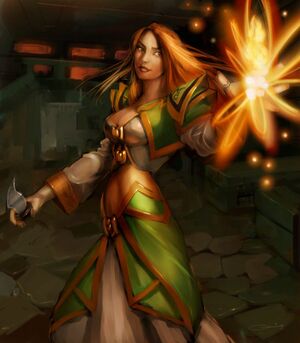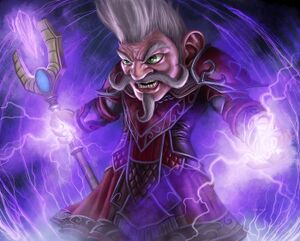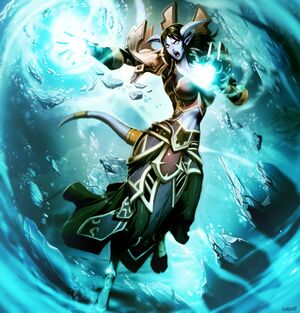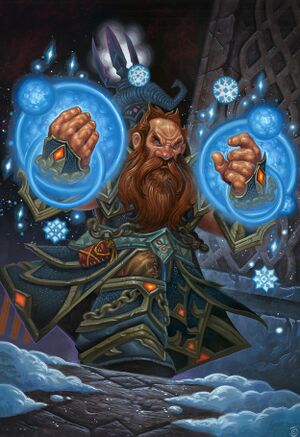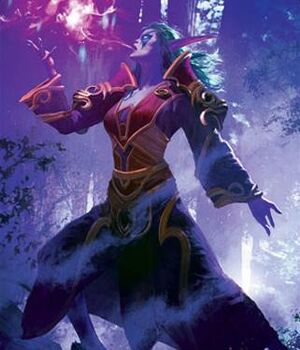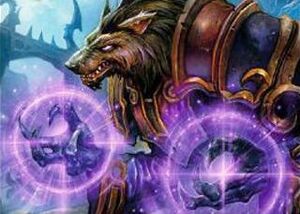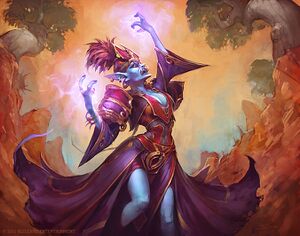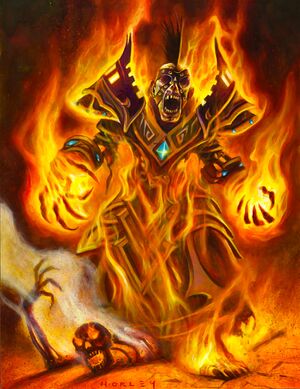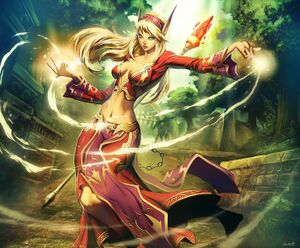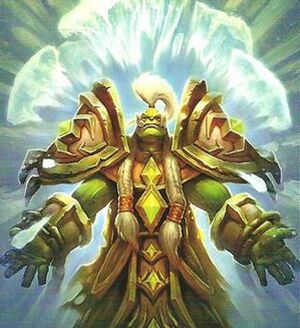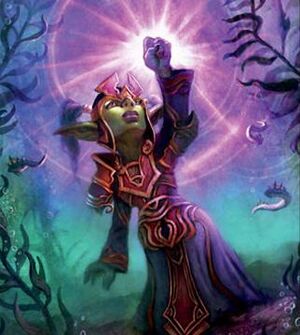Mage races
This article lists the races that are able to become mages, along with the lore behind each. As of patch 10.0 (Dragonflight), every playable race, with the notable exception of the dracthyr, may follow the path of the mage.
 Alliance
Alliance
Humans
- See also: Human (playable)#Racial traits
While humans have not wielded arcane magic for as long as high elves, they have a strong tradition of it. When high elf magi brought the secrets of arcane magic to humans, the younger race showed a natural predilection for it. Human mastery of arcane energy was instrumental in vanquishing the ancient troll empire that threatened human and high elf civilization. Humans and high elves recognized the danger arcane magic posed, and so created the Guardians of Tirisfal — powerful arcane casters who guarded against demonic invasion. Since that time, human ability with the arcane has continued and evolved; humans established the Kirin Tor, a council of archmagi who ruled Dalaran, an arcane city. Even with the destruction wrought in the Third War, humans remain consummate magi, eager to use flame and ice to scour their enemies. Many human magi are creative, creating spectacular new spells or new ways to use existing spells. The iconic human mage, however, is a powerhouse of arcane energy. She summons creatures to her aid while pounding her foes with blasts of fire or rains of slashing ice.[1]
Most of the remaining mages are human. This is mostly because Dalaran was essentially a human nation, and naturally it culled a great majority of its members from humanity. Humans are also the most populous out of all races who study the arcane arts.
When the quel'dorei trained the first batch of one hundred humans in the most rudimentary of arcana, they were surprised to find the young race had great natural affinity. The sheer, raw power they could summon up even surpassed what high elven casters were capable of mustering, but they lacked control. This trait became what forever characterized the typical style and approach of human mages. Most human mages prefer using fire and arcane spells, as they allow for the caster to dish out salvos of raging energy, which become bigger, powerful and more varied streams as the mage gains experience. However, humans still find it difficult to concentrate and focus their attacks for more precise and subtle effects. For example, while a human mage might find incinerating a cadre of gnolls child's play, lighting the tip of a candle or precisely bombarding a target without harming those around the target may be difficult.
Just like in real-life medieval wizards and witches, magi are treated with wariness because of their terrifying power. Day of the Dragon shows this through opinions that magi are "damned souls", "condemned to the same pit of darkness shared by the mythical demons of old", no matter how pure the magi's soul are.[citation needed] Even so, with the local magi training in remote cities or towers like Dalaran and the Mage Quarter, and with the holy magics of the Church of the Holy Light or the magic debilitating spells of the secretive warlock community supplementing the local guard in the enforcement of law; licensed and regulated magic has been tolerated, if not lucrative for human society. Kingdoms such as Stormwind have long employed their own conjurers and court magi.
Kul Tiran humans
While Kul Tiran mages are relatively uncommon, there are a few prominent examples,[2] such as Lord Admiral Jaina Proudmoore. After the Second War, Dalaranian and Kul Tiran magi, controlled the prison-island of Tol Barad.[3]
Gnomes
- See also: Gnome (playable)#Racial traits
In a community as eccentric as mages, for other mages to regard gnomish mages as outlandish is really a statement. Gnome mages are characterized by their bizarre and bold (some would say 'whimsically suicidal') probing into just how many things they can get their spells to do. The insatiable curiosity of gnomes is legendary, and all gnomes, of all walks of life, love to tinker. Gnomes as a race hold no general preference for any particular tree of magic or school of thought, but all are highly individualistic, and their idiosyncratic spells are evidence of this. Gnomes have the most creative spell repertoire of all the practicing races by far, and home-made gnomish spells either end up as fabulous successes or extremely dangerous failures.
Draenei 
- See also: Draenei (playable)#Racial traits
Draenei have always been natural magic users. When aboard the Oshu'gun for long journeys the draenei had plenty of hours to study and practice magic. They are one of the oldest races in the universe and therefore have had a lot of time to research and improve their knowledge of the arcane arts. Since they have had so much knowledge passed down and live such long lives to practice it, the draenei are among the most powerful mages in the known universe.
Dwarves 
- See also: Dwarf (playable)#Racial traits
This article or section includes speculation, observations or opinions possibly supported by lore or by Blizzard officials. It should not be taken as representing official lore.
|
The mages of Ironforge may have been influenced by their historical friendship with the humans and gnomes, as well as their new ties to the Dark Iron dwarves and their pyromancers. They may also have been influenced by the Dark Iron sorcerers of old, before the fragmentation of the dwarves.
Ironforge dwarves could be mages in World of Warcraft's alpha,[4] as well as in the roleplaying games, having a few named arcanists in the source books (Ryona Blondbeard and Tomli Magellas for example). In World of Warcraft the dwarf Tymor describes himself as a student of arcane magic and other lost arts,[5][6] and a dwarven mage (Dorfus Alphamage) appears in Dalaran in Wrath of the Lich King. With Cataclysm dwarven mages are once again playable. All told, it is likely that the dwarves have always had mages, though there may well have been a boom in interest in the arcane by the time of the Shattering.
Night elves 
- See also: Night elf (playable)#Racial traits
One of the new race-class combinations in Cataclysm is the night elf magi. These are returning Highborne attempting to make amends, as foreshadowed by Mordent Evenshade. They may also be night elves willing to learn the trade of the arcane once again under Highborne tutors, as witnessed at the Tower of Estulan. An individual night elven mage, Vestia Moonspear, tells her story about being more interested in the arcane and scholarly research. Arcane magic has been forbidden in Night Elf society since The Sundering, yet the Cataclysm brought about a greater need to adapt to an ever-changing world.
Worgen 
- See also: Worgen (playable)#Racial traits
The worgen of Gilneas that joined the Alliance in Cataclysm include mages that used to be human before becoming worgen. Most prominently, Archmage Arugal was once a respected Gilnean archmage, serving under Genn Greymane.[7]
 Horde
Horde
Trolls
- See also: Troll (playable)#Racial traits
Many may wonder how the trolls, a race performing primitive rituals based around a spiritual religion, could wield the arts of the arcane. Yet the recent alliance between the Darkspear Tribe and the Horde showed that the trolls are quite a perceptive race, willing to learn new ways if it is for the best of the tribe, much like the humans back in their primitive days.
The arcane arts were once exclusively elven and human, governed by the mages of Quel'thalas and the Kirin Tor of Dalaran. However, the fall of these organizations during the Third War resulted in many scattered mages across Azeroth searching for a place to settle. It is not unlikely that the trolls might have adapted their arcane knowledge from these scavengers, as well as from their recent allies, the Forsaken, who still possess knowledge of the arcane arts in undeath.
It is also possible that the Zandalar tribe, who had originally been taught arcane magic by the mogu[8], are responsible for passing the knowledge on to the Darkspear trolls.
Undead
- See also: Undead (playable)#Racial traits
Forsaken mages are mostly fallen former human mages; they may also be affected by their proximity to Dalaran, ancient minions of Archimonde who could roam the ruins of the fallen city and understand the complex science of magic.
As all their un-life is affected by the cold of their bodies, many Forsaken mages are starting to share the virtues of high elves (because they, too, have a long lifespan), using the frost school for the same reasons. A Forsaken mage has the willpower only a man that has abandoned all hope may have.
Blood elves 
- See also: Blood elf (playable)#Racial abilities
Blood Elves present a significant force of Arcane mastery in the world of Azeroth. Even before their fall, the Elves were noted for their mastery over Arcane magic. Now, that mastery has been infused with the dark desire for vengeance. Most, if not all Blood Elves have rudimentary knowledge in the Arcane arts and many choose the path of the mage. The main difference between a blood elf mage and their high elven cousins is in their preference of spells. While most high elves choose the frost school, blood elves prefer to practice fire magic.
Orcs 
- See also: Orc (playable)#Racial abilities
It is unknown if orcs could become mages before Cataclysm. Two major orc mages in lore are Acrypha and Hagara the Stormbinder. Acrypha is an eccentric old female orc who trains beginner mages in Durotar. She stayed in the Undercity libraries studying the arcane for years. Once the Shattering occurred, she decided to return to her people and teach others what she had learned. Hagara also learned the ways of the mage from the Forsaken, though she later defected to the Twilight's Hammer.[9]
A new generation of mages arose in the ranks of Garrosh Hellscream's True Horde, being called the Arcweavers. The remaining Arcweavers joined with the loyalist side after their defeat at the Siege of Orgrimmar.[10]
The Mag'har orcs of the alternate Draenor can become mages as well. They were taught how to wield the arcane by the ogres of Highmaul upon joining the Iron Horde.[11] It is also possible that they were taught by the draenei, as they have taught some orcs how to read and write.[12]
Goblins 
- See also: Goblin (playable)#Racial abilities
Goblins are intelligent creatures and prefer to fight from afar, whether by hiring others or firing off spells. This makes magi a good choice for goblins who prefer to study the arcane arts.[citation needed]
Nightborne 
As descendants of the original Highborne, the nightborne are very powerful mages. Every member of their race is able to use magic to some degree, with minor ![]() [Cantrips] being available to all characters.[13] In addition to wielding the typical arcane arts with great skill, shal'dorei mages have also displayed mastery of chronomancy, time magic. This was due to the Eye of Aman'thul's power being channeled through the Nightwell that sustained the nightborne over the millennia. Drinking the arcwine created by the Nightwell allowed the nightborne to endure for 10,000 years after the War of the Ancients, increasing their magical potency as well. In addition to combat applications, they also used time magic for more mundane needs, like rapidly aging arcwine.[14]
[Cantrips] being available to all characters.[13] In addition to wielding the typical arcane arts with great skill, shal'dorei mages have also displayed mastery of chronomancy, time magic. This was due to the Eye of Aman'thul's power being channeled through the Nightwell that sustained the nightborne over the millennia. Drinking the arcwine created by the Nightwell allowed the nightborne to endure for 10,000 years after the War of the Ancients, increasing their magical potency as well. In addition to combat applications, they also used time magic for more mundane needs, like rapidly aging arcwine.[14]
- First Arcanist Thalyssra: Former leader of the Nightfallen, now leader of all nightborne. Favors powerful barriers and defensive magic.
- Grand Magistrix Elisande: Former lord of the nightborne. Wielded powerful temporal magic that, when powered by the Nightwell, rivaled that of the bronze dragonflight.[15]
- Chief Telemancer Oculeth: Master of telemancy (portal magic). Able to establish large-scale portal networks.
Tauren 
Although the path of the arcane has long been shunned by the shu'halo, Horde tauren, from Kalimdor and Highmountain alike, have recently been seen dabbling.
 Neutral
Neutral
Pandaren mage 
- See also: Pandaren (playable)#Racial traits
While Tushui and Huojin pandaren mages from the Wandering Isle have joined forces respectively with the Alliance and the Horde, little is known about their kin's affinity for the arcane. The Shado-Pan, however, do train fire and frost magic users as their respected Omnia mages.
Other mage races
High elf mages
High elves traditionally were the most arcane-imbued race in the Alliance. Many credited them with discovering arcane magic before the draenei settled on Azeroth, and it is a matter of historical record that high elves taught arcane magic to humans many thousands of years ago. High elf magi are unparalleled masters of the craft. They usually focus their efforts on shaping and changing their spells and expanding their repertoires; they do not let the distractions of familiars, of summoning elementals, or of excessive focus on fire and ice distract them from their chosen path. The iconic high elf mage is a dark and haughty individual, claiming knowledge of arcane secrets that never fell into human hands.[1]
Elven mages tend to have more control over magic than other races. Magic is not just a craft to them, it is a way of life. Having a long lifespan affords several advantages, including plenty of time to study, hone and discover all manner of spells and different ways of applying them. As a result elves are extremely flexible casters, and can handle themselves in all manner of situations. The long-lived casters are also famed for their concentration, precision and control. Because of this, many high elves prefer using frost spells, which reward accuracy and timing. Frost spells are also highly flexible, being equally useful defensively and offensively, manifesting in various forms such as attacks, armors and cages. Blood elves, since their self-proclaimed rebirth as a new race, have embraced fire as their main tree of study.
Because of their aforementioned ability to experiment and tweak their spells throughout their long lifetimes, high elf magi are much more knowledgeable about magic than mages of other races, and often possess exclusive knowledge on secret and obscure arcana, sometimes even forbidden and dangerous. They have no humility in constantly reminding other races of this fact.
Naga mages
- Main article: Naga siren
The naga are powerful arcane spellcasters. Night elves invented the art, after all, and the naga have had 10,000 years to refine it. Indeed, one of the greatest mortal mages ever to live is the naga's queen, Azshara, who still lives. In fact, she may no longer be mortal.
Naga women are their race’s spellcasters, and over the millennia they have developed a number of talents and techniques related to their art. Through intense study they have learnt to expand their repertoires to include other, unrelated spells. Their spells strike with the fury of the sea, whipping and crushing their opponents. Naga magi receive some military training as well.
The iconic naga mage is called a siren, and she slithers forward with her brethren, glaives clutched in two of her arms. The other two weave arcane energy, and she protects her allies and decimates her opponents with her spells. She is assured and arrogant, and with good reason.
Starting attributes
| Strength | Agility | Stamina | Intellect | Spirit | Armor | Health | Mana | |||
|---|---|---|---|---|---|---|---|---|---|---|
| 21 | 17 | 20 | 23 | 24 | 34 | 52 | 165 | |||
| 22 | 16 | 23 | 22 | 21 | 33 | 62 | 150 | |||
| 15 | 22 | 20 | 27 | 22 | 44 | 52 | 225 | |||
| 20 | 20 | 20 | 23 | 22 | 40 | 52 | 165 | |||
| 17 | 25 | 19 | 23 | 22 | N/A | |||||
| 23 | 22 | 20 | 19 | 21 | N/A | |||||
| N/A | ||||||||||
| N/A | ||||||||||
| N/A | ||||||||||
| N/A | ||||||||||
| N/A | ||||||||||
| 20 | 18 | 21 | 22 | 24 | 37 | 113 | 50 | |||
| 17 | 22 | 20 | 26 | 20 | 44 | 52 | 210 | |||
| 17 | 22 | 20 | 26 | 20 | N/A | |||||
| 23 | 17 | 22 | 20 | 25 | 24 | 62 | 120 | |||
| 21 | 22 | 20 | 19 | 23 | 44 | 52 | 119 | |||
| 19 | 18 | 20 | 21 | 27 | 36 | 52 | 135 | |||
| N/A | ||||||||||
| N/A | ||||||||||
| N/A | ||||||||||
| N/A | ||||||||||
References
- ^ a b Alliance Player's Guide, pg. 20
- ^
 Ythisens 2018-11-06. Zandalari & Kul Tiran Allied Race Update. Archived from the original on 2018-11-07. Retrieved on 2018-11-07.
Ythisens 2018-11-06. Zandalari & Kul Tiran Allied Race Update. Archived from the original on 2018-11-07. Retrieved on 2018-11-07.
- ^ Baradin's Wardens. Archived from the original on 2013-05-21.
- ^ World of Warcraft Town Hall, retrieved from http://www.diablo3.nl/wow/ScreenShot.aspx?ImageIndex=159&Set=0
- ^
 [52] Passing the Burden
[52] Passing the Burden
- ^
 [52] Return to Tymor
[52] Return to Tymor
- ^ Curse of the Worgen
- ^ World of Warcraft: Chronicle Volume 1, pg. 83
- ^ Hagara the Stormbinder's dungeon journal entry
- ^ The Kosh'harg#Dialogue
- ^ Code of Rule
- ^ Overlord Geya'rah#Gossip
- ^ Nightborne (playable)#Character
- ^
 [45] How It's Made: Arcwine
[45] How It's Made: Arcwine
- ^
 [45] Gates of the Nighthold
[45] Gates of the Nighthold
| |||||||||||

